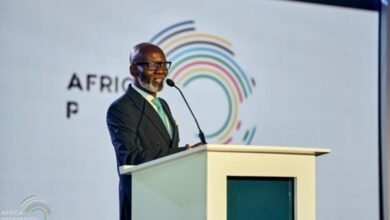At the head of a group that is among the jewels of the Tunisian industrial fabric, Foued Gueddich is also president of CONECT International, an employers’ confederation that conducts a number of actions in favor of the Tunisian private sector, the Tunisian society more broadly. Interview-portrait.
Interviewed by Dounia Ben Mohamed, in Tunis
Foued Gueddich you are at the helm an agri-business group exporting Tunisia-made products around the world. How did you become an export champion?
I am the manager of an industrial group, with a company specializing in processing of vegetables and local and Mediterranean products, SunAntipasti; the other produces brick sheets. We also have two other structures, one specialized in food products, Agrigold and the other in the export of handicrafts including Foutas (traditional towels), mainly to the United States (2MIT TUNISIE). I head this small group and we try to be a small champion of Tunisia’s exports.
My journey began in the army. I was an officer cadet pilot. I have been marked by that training. It taught me perseverance in particular, apart from scouting.
I was born in a particular region in Tunisia, called La Pêcherie, a small village 3 km from Bizerte, home to a military base, where the Air Force, the Navy and the Army were located. It was this environment that led me to hope to become, one day, a pilot.
I thus pursued a small career in the Air Force while continuing my studies in Sfax on the quantitative method applied to management. Then, like any Tunisian I headed for Tunis to try to earn a living. I then started my career in the Poulina group, where I did not stay long. Then, I spent five years at COTUNACE, the Tunisian company for the insurance of foreign trade. I was then the first to ask the CEO for a favor: the possibility to follow a DESS in international trade which I successfully completed. I wanted to step to the other side. Then, I had the opportunity to join a quite well-known group, BSB, as manager of the new subsidiary specialized in olive oil which was to open in Dubai. For various reasons, I was appointed export manager of the structure. A big advantage in my career: it allowed me to go around the world in two years.
« Everyone was thinking about the local market and import; I am hardheaded, I wanted to persevere in export, for our group and our country, to bring in currency while others were taken it out … »
At that time, I was 31 years old. I then wanted to change course. I took advantage of the positive wave the politicians tried to implement in 1997, in particular the Higher Council of Export which allowed young entrepreneurs aged less than 40 to create an international trade company in reduced capital, namely 20 000 Tunisian dinars (10 000 Euro). Therefore, I created an international trade company with a local group. I started with the olive oil that we exported in bulk to the USA. I am making my way. We are starting to export packaged olive oil, dates to Australia, my first market. We started another phase when my partner, an agri-food engineer, announced that he was going to settle in France. We will then prepare the famous Mechouia salad and Harissa, which we will market for the Leclerc group. We did not have a factory at the time. The adventure of SUNANTIPASTI… starts like that. We set up a small shop in the countryside, and we marketed local products. We are going to be known very quickly. We will be present on supermarkets in France. We develop the production tool. From nothing, we start to develop. Then we were contacted by the company Mosaïque, our current partner and distributor, which took over the distribution of the « Jardins de Carthage » brand in France. That leap forward allowed us to be present in many more supermarkets. In the meantime, we have created a subsidiary specialized in the ethnic sector in Lyon and we are boosting our exports to Europe. At the same time, our distributor Mosaïque, expresses a need for brick sheets, totally for the export. And so on…
Everyone was thinking about the local market and import; I am hardheaded, I wanted to persevere in export, for our group and our country, to bring in currency while others were taken it out … I, it must be said, had the chance to have an exceptional training at the Higher Institute of Management (ISG) in Tunis, where I attended evening classes, with practitioners, customs officers, freight forwarders, with my global experience … The fruit of the Higher Council of Export in 1997 which sought among others to train people to become exporters.
A journey that brings you to the head of CONECT. How and why did you join this organization in the first place?
Probably because of my Kerkennian origins, I found myself in the UTICA, the historic employers’ association, where I was elected to the executive board of the SCI. I was part of the youth branch, a bit revolutionary, which wanted to make things happen, but I did not find my place in this a little bit old-fashioned organization. I resigned. Mrs. Mounia Saidi contacted me and offered me to join the executive board of CONECT International which was in the creation phase. After a first very active term, in the fourth year, during the elections, I had no intention of running but Mounia insisted…
What is your roadmap as president of CONECT, an organization that became known after the revolution for criticizing the decisions taken by politicians but also to make proposals…? In the context of the current crisis in Tunisia, what are your requests?
CONECT’s first objective is to try, in this period where we see repeated blows against investment and export, to defend the interests of operators, exporters and others, in relation to the various joint chambers of the place, to defend the interests of members and the sector in general. And there is the other essential component to make proposals by conducting sector-based studies, for example on the port of Rades, which is experiencing a problem of saturation.
We also organize economic and diplomatic missions set up by CONECT International to help operators in Europe and Africa.
About Africa precisely. How do you encourage your members to go to the continent to capture new markets and how do you support them?
We recently went on a mission to Mauritania with 43 businesspersons. That region was ignored, although it is a natural and promising market. With free zones, they have just discovered gas, they have sealed a partnership with Senegal … There is a lot of potential in this country. And they are thirsty for the transfer of skilled workers. Given the high unemployment rate in Tunisia, it is a natural market for Tunisians while these people need our skilled workers.
The mission, anyway, resulted in the signing of three agreements. This is the role of CONECT International, the state is asleep; it is the private sector that plays this role of economic diplomacy unlike the general condition of the Tunisian population, which is waiting for a miracle that is the result of the populist political discourse ….
« We lost our place as a hub. Today the private sector must take its destiny in hand. But to do that, the government must let us work! »
Do you also invite your peers to go outside your « usual » area, i.e. North Africa and West Africa. East Africa, for example, is experiencing a certain dynamic…
Before Mauritania, we were in Senegal. We choose our missions based on our members’ demand. We conduct surveys among our members. For Mauritania, it was among the top requests, followed by Senegal, Côte d’Ivoire but also Kenya.
It should be noted that Mauritania was the first country to recognize Tunisia’s independence.
The Tunisian government is very interested in the transfer of skilled workers, but also in the cultural and religious aspects, and I believe that Mauritania offers interesting opportunities, especially with the current difficulties in the Libyan market, and also in Algeria. We have also been approached by the Maltese employers’ association, where we conducted a mission from May 5 to 10. We will follow the same approach with the Bulgarians. We develop this triangular-based approach Europe, Tunisia, Africa.
Tunisia is indeed the natural hub, but it is now challenged by Morocco, Egypt …
We lost our place as a hub … We are losing ground. But today the private sector must take its destiny in hand. But to do that, the government must let us work! If we look at the 2019 finance law, it goes against the interests of the private sector. The fatal blow was struck by the Finance Act 2022 … It is a suicidal system.
What is the alternative for Tunisia?
We have to go down on the ground. It is true that Africa is a godsend, but today we are off the mark. The formidable weapon is the logistics. How to have results and take advantage of this opportunity without a logistics strategy. So we will stay on the margin… Today our only hope, with the Algerians, is to try to capitalize on this Algiers-Nouakchott route. This is the work of CONECT. Thanks to a new generation of leaders and given the current problems. CONECT is well positioned to do this job.






